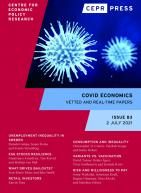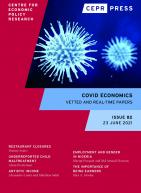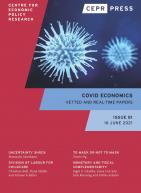
I calibrate an eco-epidemiological age-structured SIR model of the B.1.1.7 covid variant on the eve of the vaccination campaign in France, under a stop-and-go lockdown policy. Three-quarters of the welfare benefit of
the vaccine can be achieved with a speed of 100,000 full vaccination per day. A 1-week delay in the vaccination campaign raises the death toll by approximately 2,500, and it reduces wealth by 8 billion euros. Because of the large heterogeneity of the rates of hospitalization and mortality across age classes, it is critically important for the number of lives saved and for the economy to vaccinate older people first. Any departure from this policy has a welfare cost. Prioritizing the allocation of vaccines to the most vulnerable people save 70k seniors, but it also increases the death toll of younger people by 14k. Vaccine nationalism is modeled by assuming two identical Frances, one with a vaccine production capacity and the other without it. If the production country vaccinates its entire population before exporting to the other, the global death toll would be increased by 20\%. I also measure the welfare impact of the strong French anti-vax movement, and of the prohibition of an immunity passport
Citation
Gollier, C (2021), ‘The welfare cost of vaccine misallocation, delays and nationalism‘, COVID Economics 74, CEPR Press, Paris & London. https://cepr.org/publications/covid-economics-issue-74#392514_392950_408809
We investigate the impact of 2020 COVID-19 rental eviction moratoria on household well-being. Analysis of new panel data indicates that eviction moratoria reduced evictions and resulted in redirection of scarce household financial resources to immediate consumption needs, notably including food and grocery spending. We also find that eviction moratoria reduced household food insecurity and mental stress, with larger effects evidenced among African American households. Findings suggest broad salutary effects of eviction moratoria during a period of widespread virus and economic distress.
Citation
Gabriel, S, N Tzur-Ilan and X An (2021), ‘COVID-19 Rental Eviction Moratoria and Household Well-Being‘, COVID Economics 74, CEPR Press, Paris & London. https://cepr.org/publications/covid-economics-issue-74#392514_392950_390753
Using a sample of 125 countries, we evaluate the effect of the pre-Covid-19 fiscal space on the size of the fiscal stimulus packages in response to the virus. We find that higher ratings and higher tax revenues (to public debt) predict the size of fiscal stimuli, while public debt (to GDP) does not. These findings vary with countries’ level of economic development and the composition of fiscal support.
Citation
Minea, A, X Deburn, A Estel Apeti and J Combes (2021), ‘Did Fiscal Space Influence Covid-19’s Fiscal Response?‘, COVID Economics 74, CEPR Press, Paris & London. https://cepr.org/publications/covid-economics-issue-74#392514_392950_390751
Following the Great Lockdown in 2020, it is important to take stock of lessons learned. How effective have different containment measures been in slowing the spread of Covid-19? Have containment measures been costly in terms of economic growth, fiscal balances, and accumulated debt? This paper finds that countries with previous SARS experience acted fast and "smart", and were able to contain the virus by relying mainly on public health measures —testing, contact tracing, and public information campaigns— rather than stay-at-home requirements. Using past coronavirus outbreaks as an instrumental variable, we show that countries with past experience were able to contain the virus in a smart way, reducing transmission and deaths while also experiencing higher economic growth in 2020.
Citation
Lagerborg, A and A Fotiou (2021), ‘Smart Containment:Lessons from Countries with Past Experience‘, COVID Economics 74, CEPR Press, Paris & London. https://cepr.org/publications/covid-economics-issue-74#392514_392950_390752
The coronavirus disease 2019 (COVID-19) pandemic has impacted the world economy in various ways. In particular, the drastic shift to telework has dramatically changed how people work. Whether the new style of working from home (WFH) will remain in our society highly depends on its effects on workers’ productivity. However, to the best of our knowledge, the effects of WFH on productivity are still unclear. By leveraging unique surveys conducted at four manufacturing firms in Japan, we identify the possible factors of productivity changes due to WFH. Our main findings are as follows. First, after ruling out the time-invariant component of individual productivity and separate trends specific to employee attributes, we find that workers who worked from home experienced productivity declines more than those who did not. Second, our analysis shows that poor WFH setups and communication difficulties are the major reasons for productivity losses. Third, we find that the mental health of workers who work from home is significantly better than that of workers who are unable to work from home. Our result suggests that if appropriate investments in upgrading WFH setups and facilitating communication can be made, WFH may improve productivity by improving employees’ health and well-being.
Citation
Owan, H, S Kuroda, H Okudaira and R Kitagawa (2021), ‘Working from home: its effects on productivity and mental health‘, COVID Economics 74, CEPR Press, Paris & London. https://cepr.org/publications/covid-economics-issue-74#392514_392950_390750


Covid Economics - Issue 82
- Restaurant Closures during the Pandemic: A Descriptive Analysis
- Underreporting Child Maltreatment during the Pandemic: Evidence from Colorado
- Covid-19 impact on Artistic Income
- COVID-19, Employment, and Gender: Evidence from Nigeria
- The Importance of Being Earners: Modelling the Implications of Changes to Welfare Contributions on Macroeconomic Recovery
